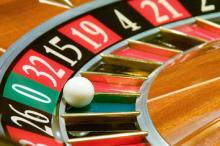Played in its most simple incarnation, the game of roulette has some of the best odds in any given casino. In the American version of the game, which has 36 numbered slots and 2 zero slots (the 0 and 00 as opposed to the European single 0 layout), a player who only bets on red, black, odds or evens has a 47% of winning. Even if the payout is ridiculously small, it beats losing money. During my first trip to Las Vegas, I kept those odds in mind. I've never gotten much thrill out of gambling, so the prospect of winning small and easy appealed to me much more than the thought of taking home the jackpot on a long shot. While my travel companion settled down for what I would classify as an inconsiderately lengthy tenure at the poker table, I decided to try my hand at the little wheel. Seated at a $5 table, I put the minimum on black and promptly lost. The laws of probability on my side, I tried the same thing again and watched history repeat itself. That's when the calm voice of reason in my brain stood up, cleared its throat and produced a rather well-drawn graph of a recent individual cost/benefit analysis concerning the relative merits of staying at the roulette table or adjourning to casino lounge for a drink, both of which would have cost roughly the same amount of money. Five minutes later, I had a glass of scotch in my hand and no regrets.
This scenario plays out, in one form or another, countless times every single day. A human being, possessed of the ability to reason, chooses immediate, limited pleasure or potentially limitless benefit in exchange for long-term effort. Neither choice is inherently superior to the other. Deciding which one is more worthwhile is purely context-based. People invest their money hoping to profit despite the significant chance of going broke. They have children hoping to foster love and pride despite the chance their children may be the source of great agony or disappointment. The joy of the positive outcome is great and the pain of the negative is crushing.
Alcohol is almost never a long-term investment and when it is it's never going to turn out well. Alcoholics are the only people who are making a big decision when they choose whether or not to drink. For everyone else, it's purely immediate and brief. Drinks are finite and discreet, their effects likewise. Alcohol is an investment in right now. That's why we drink it. Like a candy bar, a one-night stand or a song, the drink is an indulgence and a way to put one's self in the moment. There's nothing imaginary involved with an ethanol high. It is a concrete sensation. The same can't be said for long-term prospects. A man doesn't gamble because he's certain he'll profit. He doesn't conceive a child because he knows being a father will make him happier. He just hopes, he uses his imagination to envision a future benefit that may never come to be.
Perhaps this is why alcohol has always been a part of ceremonies. We drink during religious rituals and we toast special occasions because alcohol anchors us to the present. Maybe it's due to the depressive nature of ethanol or maybe it's the sharp, distinct flavor. Whatever it is, the drink is a chemical of seconds and minutes, a way to take our brains out the future.
